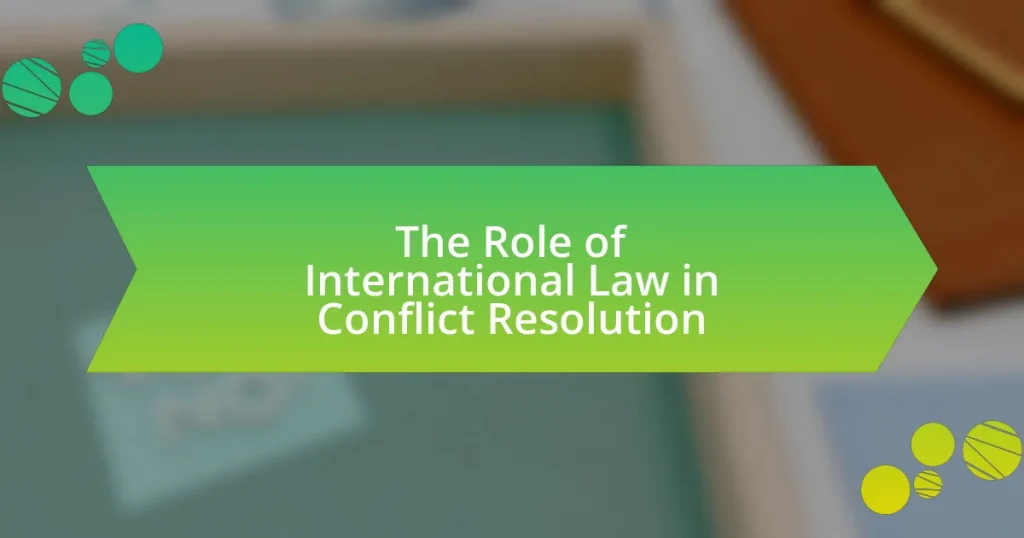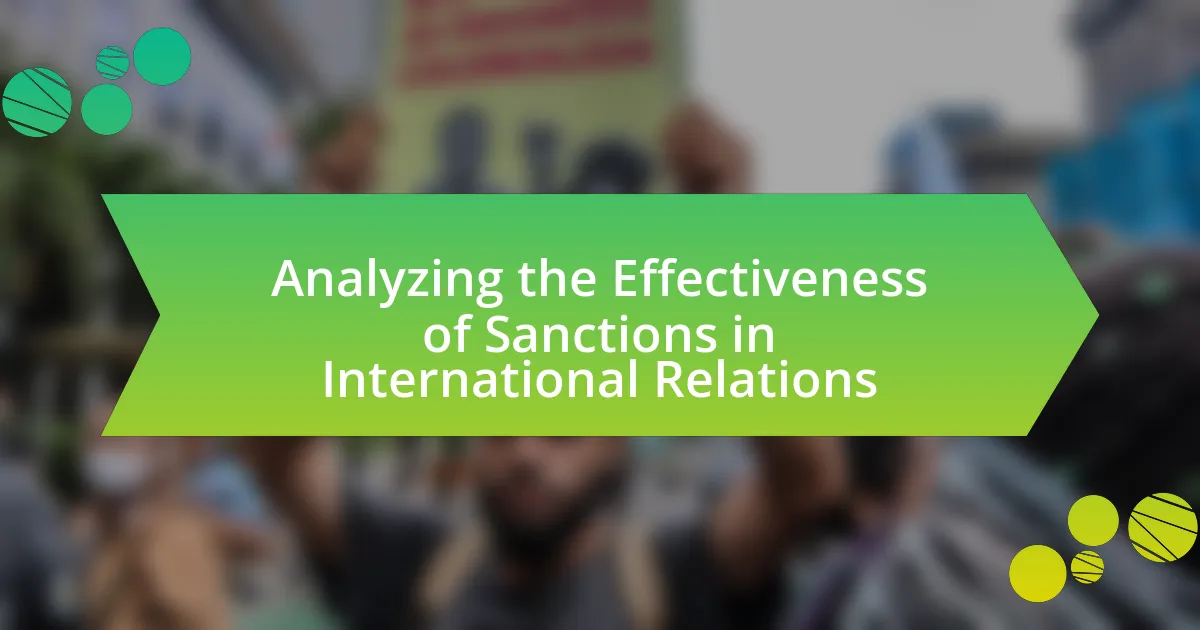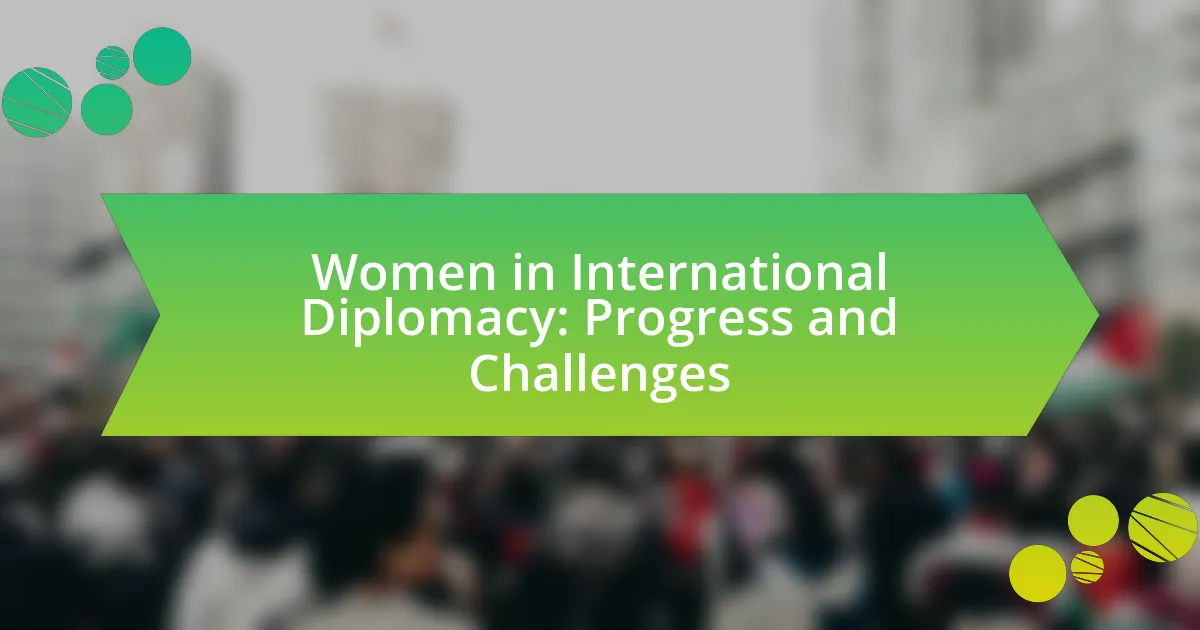The article examines the critical role of international law in conflict resolution, highlighting its framework that includes treaties, conventions, and customary laws designed to facilitate peaceful dispute settlement among states. It discusses key principles such as sovereignty, non-intervention, and self-determination, which underpin the effectiveness of international law in managing conflicts. The article also explores the mechanisms available for conflict resolution, including negotiation, mediation, and adjudication through international courts, while addressing the challenges faced in enforcing international law and the impact of cultural differences on its application. Additionally, it emphasizes the importance of international organizations, particularly the United Nations, in promoting peace and security through diplomatic efforts and legal frameworks.
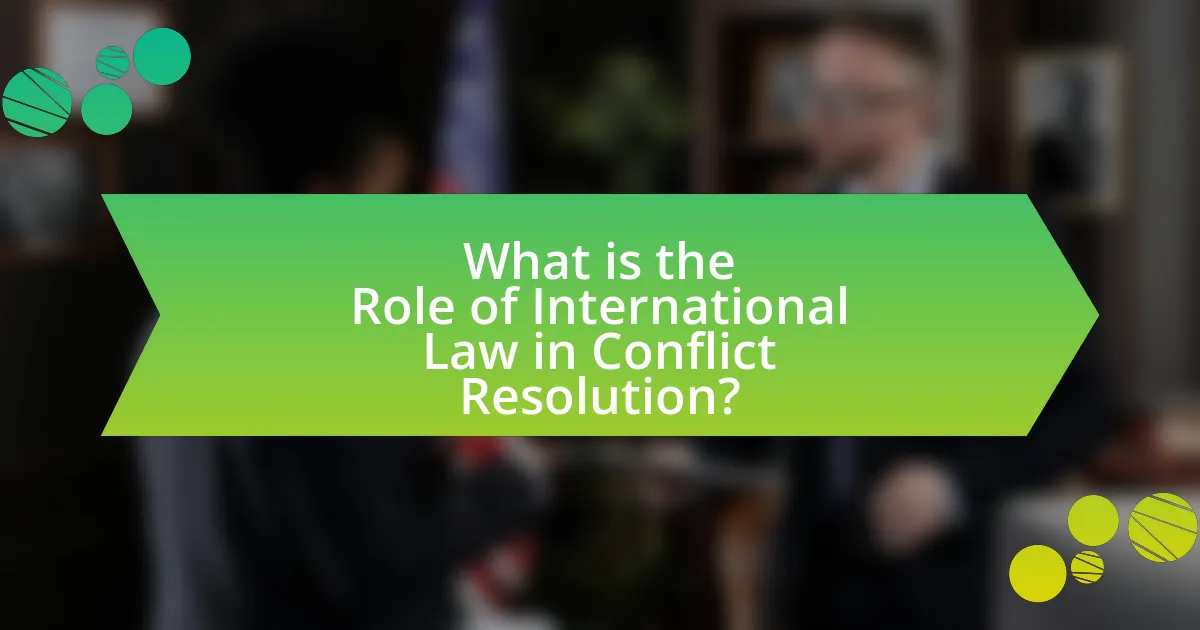
What is the Role of International Law in Conflict Resolution?
International law plays a crucial role in conflict resolution by providing a framework for the peaceful settlement of disputes between states. This framework includes treaties, conventions, and customary laws that establish norms and procedures for addressing conflicts. For instance, the United Nations Charter emphasizes the importance of resolving disputes through negotiation, mediation, and arbitration, which are essential mechanisms in international law. Historical examples, such as the Peace of Westphalia in 1648, demonstrate how international law has been instrumental in ending conflicts and establishing state sovereignty. Additionally, international courts, such as the International Court of Justice, adjudicate disputes based on legal principles, further reinforcing the role of international law in maintaining global peace and security.
How does international law facilitate conflict resolution?
International law facilitates conflict resolution by providing a structured framework for states to address disputes through negotiation, mediation, and adjudication. This framework includes treaties, conventions, and customary laws that establish norms and procedures for peaceful resolution. For example, the United Nations Charter emphasizes the importance of resolving disputes through peaceful means, which has led to the establishment of various international courts, such as the International Court of Justice, that adjudicate disputes between states. Historical instances, such as the resolution of territorial disputes through arbitration under international law, demonstrate its effectiveness in preventing escalation and fostering diplomatic dialogue.
What are the key principles of international law that support conflict resolution?
The key principles of international law that support conflict resolution include the principles of sovereignty, non-intervention, self-determination, and peaceful settlement of disputes. Sovereignty establishes that states have the authority to govern themselves without external interference, which is crucial for maintaining order and respect among nations. Non-intervention prohibits states from intervening in the internal affairs of other states, thereby promoting stability and reducing the likelihood of conflict escalation. Self-determination allows peoples to determine their political status and pursue their economic, social, and cultural development, which can mitigate tensions. The principle of peaceful settlement of disputes encourages states to resolve conflicts through negotiation, mediation, or arbitration, as outlined in the United Nations Charter. These principles collectively foster an environment conducive to resolving conflicts amicably and maintaining international peace.
How do treaties and agreements play a role in resolving conflicts?
Treaties and agreements serve as formal instruments that establish legally binding commitments between parties, facilitating conflict resolution by providing a structured framework for negotiation and cooperation. These legal documents often outline specific terms for peace, territorial disputes, or resource sharing, which can help to de-escalate tensions and prevent future conflicts. For example, the Treaty of Versailles in 1919 aimed to resolve World War I disputes by imposing reparations and territorial changes, demonstrating how treaties can shape post-conflict relations. Additionally, agreements like the Camp David Accords in 1978 successfully brokered peace between Egypt and Israel, illustrating the effectiveness of treaties in achieving lasting resolutions.
Why is international law important in managing conflicts?
International law is crucial in managing conflicts because it establishes a framework for resolving disputes between states and other international actors. This framework includes treaties, conventions, and customary laws that provide guidelines for acceptable behavior, thereby reducing the likelihood of escalation into violence. For instance, the United Nations Charter promotes peaceful resolution of conflicts and prohibits the use of force, which has been instrumental in mediating disputes and preventing wars. Historical examples, such as the Geneva Conventions, demonstrate how international law has set standards for humanitarian treatment during conflicts, thereby protecting civilians and reducing suffering.
What are the consequences of ignoring international law in conflicts?
Ignoring international law in conflicts leads to severe consequences, including increased violence, prolonged conflicts, and violations of human rights. When states or non-state actors disregard established legal frameworks, such as the Geneva Conventions, they often engage in actions that escalate hostilities and result in civilian casualties. For instance, the Syrian Civil War has seen numerous violations of international humanitarian law, contributing to a humanitarian crisis with millions displaced and significant loss of life. Furthermore, ignoring international law undermines global stability and can lead to international sanctions or military interventions, as seen in the case of Russia’s annexation of Crimea, which prompted widespread condemnation and economic sanctions from the international community. These actions not only affect the immediate parties involved but also have broader implications for international relations and the enforcement of global norms.
How does international law promote peace and security?
International law promotes peace and security by establishing a framework for the resolution of disputes between states and providing mechanisms to prevent conflicts. This framework includes treaties, conventions, and customary laws that govern state behavior, thereby reducing the likelihood of war. For example, the United Nations Charter, which is a cornerstone of international law, emphasizes the importance of peaceful settlement of disputes and prohibits the use of force except in self-defense or with Security Council authorization. Additionally, international law facilitates cooperation among nations through agreements on arms control, human rights, and environmental protection, which contribute to global stability and security.
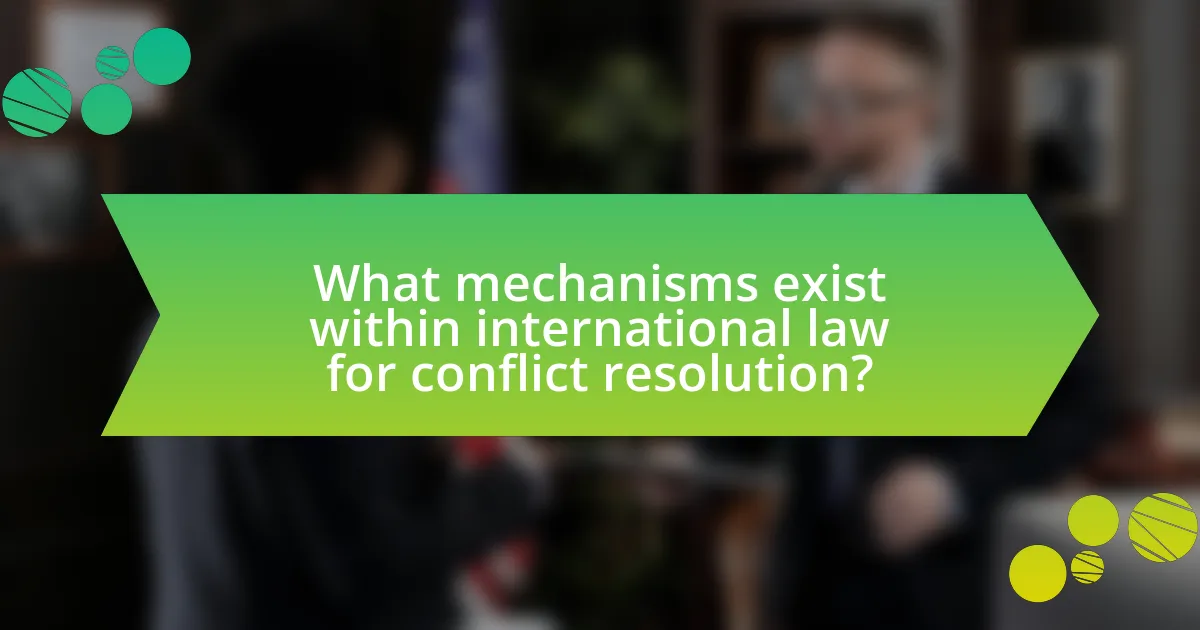
What mechanisms exist within international law for conflict resolution?
International law provides several mechanisms for conflict resolution, including negotiation, mediation, arbitration, and adjudication through international courts. Negotiation allows parties to directly communicate and reach a mutually acceptable solution, while mediation involves a neutral third party facilitating dialogue to help resolve disputes. Arbitration is a more formal process where an impartial tribunal makes a binding decision based on the evidence and arguments presented by the parties. Adjudication occurs in international courts, such as the International Court of Justice, which resolves disputes between states based on legal principles and treaties. These mechanisms are essential for maintaining peace and stability in the international system, as they offer structured approaches to resolving conflicts without resorting to violence.
How do international courts and tribunals contribute to conflict resolution?
International courts and tribunals contribute to conflict resolution by providing a legal framework for the peaceful settlement of disputes between states and other entities. These institutions, such as the International Court of Justice (ICJ) and various ad hoc tribunals, facilitate dialogue and negotiation, ensuring that conflicts are addressed through established legal principles rather than through force. For instance, the ICJ has resolved numerous territorial disputes, such as the case between Nicaragua and Honduras regarding maritime boundaries, which underscores the effectiveness of legal adjudication in mitigating tensions. By offering binding decisions and fostering compliance with international law, these courts enhance stability and predictability in international relations, thereby playing a crucial role in conflict resolution.
What types of cases do international courts typically handle?
International courts typically handle cases involving disputes between states, violations of international law, human rights issues, and war crimes. These courts, such as the International Court of Justice and the International Criminal Court, adjudicate matters that include territorial disputes, treaty interpretations, and accountability for crimes against humanity. For instance, the International Criminal Court prosecutes individuals for genocide, war crimes, and crimes against humanity, reinforcing the enforcement of international law.
How effective are international courts in enforcing their rulings?
International courts are generally limited in their effectiveness in enforcing their rulings due to reliance on state cooperation and lack of direct enforcement mechanisms. For instance, the International Court of Justice (ICJ) can issue binding decisions, but it lacks the authority to enforce them, relying instead on the United Nations Security Council, which may not always act. Historical examples, such as the ICJ’s ruling in the 1986 Nicaragua case, demonstrate that while the court found the U.S. actions unlawful, the U.S. did not comply with the ruling, highlighting the challenges faced by international courts in ensuring compliance. Additionally, the effectiveness of enforcement varies significantly among different courts, with regional courts like the European Court of Human Rights having more mechanisms for compliance compared to global institutions.
What role do international organizations play in conflict resolution?
International organizations play a crucial role in conflict resolution by facilitating dialogue, providing mediation, and implementing peacekeeping operations. These organizations, such as the United Nations, often serve as neutral parties that bring conflicting sides together to negotiate and reach agreements. For instance, the UN has been involved in numerous peacekeeping missions, such as in Cyprus and the Democratic Republic of the Congo, where it has helped to stabilize regions and reduce hostilities. Additionally, international organizations can impose sanctions or offer incentives to encourage compliance with peace agreements, thereby reinforcing their effectiveness in resolving conflicts.
How does the United Nations facilitate conflict resolution?
The United Nations facilitates conflict resolution through diplomatic negotiations, peacekeeping missions, and the establishment of international legal frameworks. The UN employs mediators to engage conflicting parties in dialogue, aiming to reach peaceful settlements, as seen in various peace processes like the Camp David Accords in 1978. Additionally, UN peacekeeping forces are deployed to maintain ceasefires and protect civilians, exemplified by missions in countries such as Liberia and the Democratic Republic of the Congo. Furthermore, the UN promotes international law, including treaties and conventions, which provide legal standards for conflict resolution, such as the UN Charter, which emphasizes the peaceful settlement of disputes.
What are the limitations of international organizations in resolving conflicts?
International organizations face several limitations in resolving conflicts, primarily due to issues of sovereignty, lack of enforcement power, and political biases. Sovereignty restricts the ability of organizations like the United Nations to intervene in domestic matters without the consent of the state involved, as seen in the case of the Syrian civil war where intervention was complicated by the Assad regime’s refusal to allow outside involvement. Additionally, international organizations often lack the authority to enforce resolutions or sanctions effectively, which was evident when the UN’s peacekeeping missions struggled to maintain order in countries like Rwanda during the genocide in 1994. Political biases among member states can also hinder impartial conflict resolution, as seen in the Security Council, where veto power held by permanent members can block actions that may be necessary to resolve conflicts, such as in the case of the ongoing Israeli-Palestinian conflict. These limitations significantly impact the effectiveness of international organizations in achieving lasting peace and resolution in conflicts.
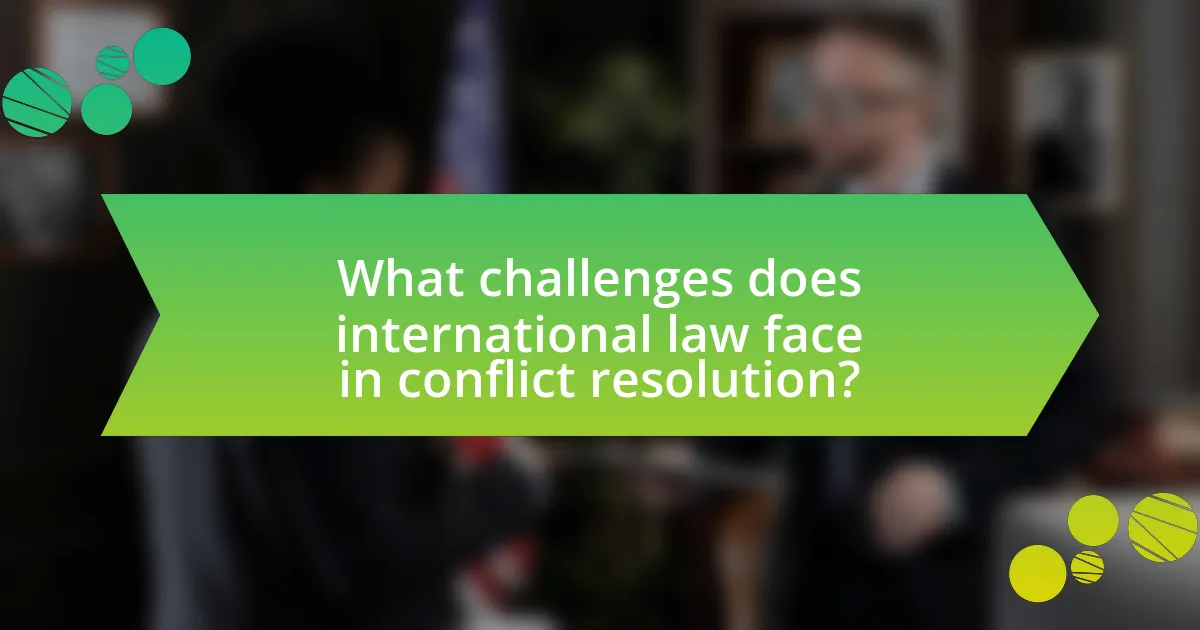
What challenges does international law face in conflict resolution?
International law faces significant challenges in conflict resolution, primarily due to issues of enforcement, state sovereignty, and the lack of universal jurisdiction. Enforcement is problematic because international law relies on states to comply voluntarily, and there are limited mechanisms to compel compliance, as seen in cases like the Syrian civil war where international resolutions have been largely ignored. State sovereignty often leads to reluctance among nations to submit to international legal processes, as demonstrated by the United States’ withdrawal from the International Criminal Court’s jurisdiction. Additionally, the absence of a universally accepted legal framework complicates the resolution of conflicts, as different states may interpret laws differently, leading to inconsistencies in application and enforcement.
Why do states sometimes refuse to comply with international law?
States sometimes refuse to comply with international law due to national interests that conflict with international obligations. For instance, a state may prioritize its sovereignty or security over adherence to treaties, as seen in cases where countries have withdrawn from agreements like the Paris Agreement on climate change, citing economic concerns. Additionally, political regimes may reject international norms to maintain power or appeal to nationalist sentiments, exemplified by instances where governments ignore human rights treaties. These refusals often stem from a perception that compliance could undermine their domestic policies or geopolitical strategies.
What are the political and practical reasons for non-compliance?
Non-compliance with international law often arises from political motivations and practical challenges. Politically, states may prioritize national interests, sovereignty, or ideological beliefs over adherence to international agreements, leading to selective compliance. For instance, a country may refuse to comply with a treaty if it perceives that doing so would undermine its security or economic interests. Practically, non-compliance can stem from logistical issues, such as lack of resources or capacity to implement legal obligations, as seen in developing nations struggling to enforce environmental regulations due to insufficient infrastructure. These factors illustrate how political and practical considerations can significantly influence a state’s willingness to comply with international law.
How can the enforcement of international law be improved?
The enforcement of international law can be improved by enhancing cooperation among states, strengthening international institutions, and increasing accountability mechanisms. Enhanced cooperation can be achieved through multilateral agreements that promote compliance and collective action, as seen in treaties like the Paris Agreement, which encourages nations to work together on climate change. Strengthening international institutions, such as the International Criminal Court, can provide more robust frameworks for prosecution and adjudication of violations, thereby deterring future breaches. Increasing accountability mechanisms, including sanctions and the establishment of international tribunals, can ensure that violators face consequences, as demonstrated by the sanctions imposed on countries for human rights violations. These strategies collectively contribute to a more effective enforcement of international law.
How do cultural and regional differences impact the effectiveness of international law?
Cultural and regional differences significantly impact the effectiveness of international law by influencing how laws are interpreted, accepted, and enforced within various jurisdictions. For instance, legal systems in Western countries often emphasize individual rights and formal legal processes, while many non-Western cultures may prioritize community values and informal dispute resolution methods. This divergence can lead to challenges in the implementation of international treaties, as seen in the varying adherence to human rights conventions across different regions. According to a study by the United Nations Development Programme, cultural context shapes the perception of justice, which affects compliance with international legal standards. Thus, the effectiveness of international law is often contingent upon the alignment of its principles with local cultural norms and practices.
What are some examples of cultural conflicts that challenge international law?
Cultural conflicts that challenge international law include the Israeli-Palestinian conflict, where differing national identities and historical claims complicate legal resolutions, and the Rohingya crisis in Myanmar, which involves ethnic discrimination and violations of human rights. In the Israeli-Palestinian conflict, the clash between Jewish and Palestinian national narratives has led to disputes over territory and sovereignty, making it difficult to apply international legal frameworks effectively. The Rohingya crisis highlights the challenges of protecting minority rights under international law, as the Myanmar government has been accused of ethnic cleansing and violations of humanitarian law against the Rohingya people. These examples illustrate how cultural identities and historical grievances can obstruct the enforcement of international legal norms.
How can international law adapt to diverse cultural contexts?
International law can adapt to diverse cultural contexts by incorporating local customs and practices into its frameworks. This adaptation is essential for ensuring that legal norms resonate with the values and beliefs of different societies, thereby enhancing compliance and effectiveness. For instance, the United Nations Declaration on the Rights of Indigenous Peoples recognizes the importance of indigenous cultures and their rights, allowing for a more inclusive approach to international law that respects cultural diversity. Additionally, case studies, such as the application of restorative justice practices in various countries, demonstrate how international legal principles can be tailored to fit local traditions, promoting conflict resolution that is culturally relevant and accepted.
What best practices can enhance the role of international law in conflict resolution?
Best practices that can enhance the role of international law in conflict resolution include promoting adherence to international treaties, fostering dialogue through diplomatic channels, and strengthening international institutions. Adherence to treaties, such as the United Nations Charter, establishes legal frameworks that guide state behavior and conflict resolution processes. Diplomatic dialogue, facilitated by neutral mediators, can help de-escalate tensions and lead to peaceful negotiations. Strengthening institutions like the International Court of Justice ensures that disputes are resolved through legal means rather than military action, as evidenced by the court’s role in resolving territorial disputes and upholding human rights standards. These practices collectively reinforce the effectiveness of international law in mitigating conflicts and promoting lasting peace.
How can states better engage with international legal frameworks?
States can better engage with international legal frameworks by actively participating in treaty negotiations and implementing international agreements into domestic law. This engagement ensures that states not only contribute to the creation of legal norms but also adhere to them, fostering accountability and cooperation. For instance, the United Nations Charter obligates member states to respect international law, and states that incorporate such frameworks into their legal systems demonstrate commitment to global governance. Additionally, states can enhance their engagement by collaborating with international organizations, such as the International Criminal Court, to address violations of international law, thereby reinforcing the rule of law and promoting peace and security.
What strategies can be employed to promote adherence to international law?
To promote adherence to international law, states can implement strategies such as strengthening international institutions, enhancing legal frameworks, and fostering diplomatic engagement. Strengthening international institutions, like the United Nations, provides a platform for enforcement and accountability, as seen in the International Criminal Court’s role in prosecuting war crimes. Enhancing legal frameworks involves creating clear, binding treaties that outline obligations, which can be observed in the Geneva Conventions that govern armed conflict. Fostering diplomatic engagement encourages dialogue and negotiation, reducing the likelihood of conflicts that violate international law, as demonstrated by peace treaties that have successfully resolved disputes. These strategies collectively contribute to a more robust adherence to international law.
